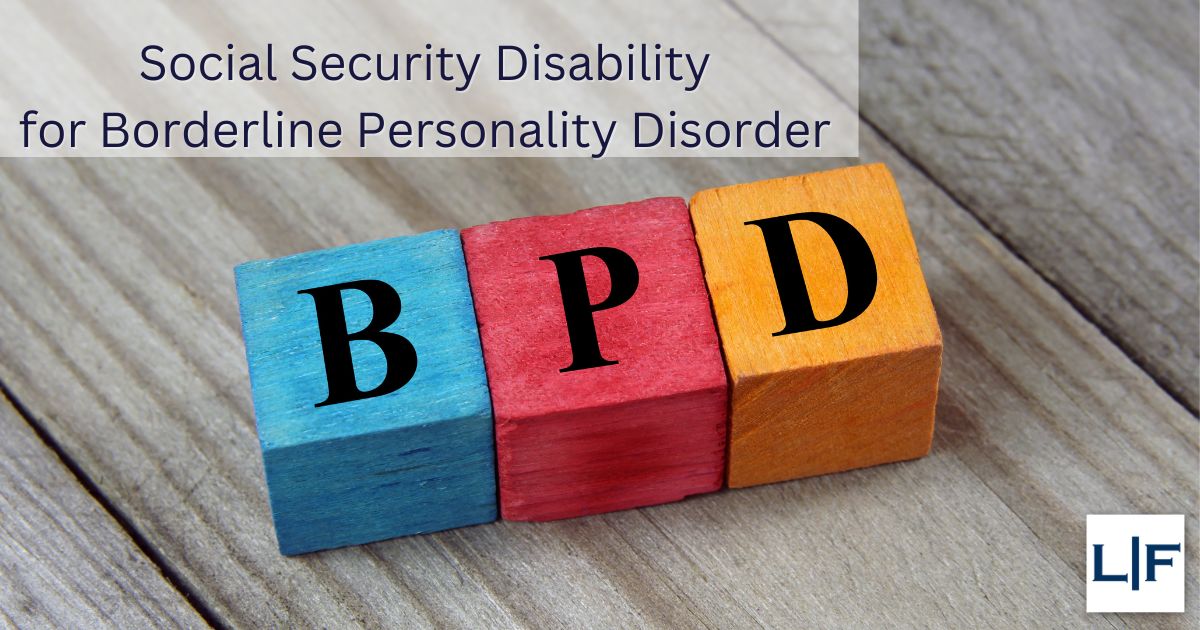Some people who suffer from Borderline Personality Disorder qualify for disability benefits.
Personality disorders are characterized by unhealthy and rigid thoughts and behaviors that greatly affect people’s ability to deal with work, relationships, and other everyday stresses. There is no known cure for disorders of this nature, but treatment may help. Personality disorders encompass a large group of sub-disorders, each with their own symptoms, ranging from mild to severe. Some of the most common personality disorders include:
- Antisocial personality disorder
- Avoidant personality disorder
- Borderline personality disorder
- Dependent personality disorder
- Histrionic personality disorder
- Narcissistic personality disorder
- Obsessive-compulsive personality disorder
- Paranoid personality disorder
- Schizoid personality disorder
Those with severe forms of a personality disorder might be eligible to receive Social Security disability benefits. Below, we review the basic criteria for collecting Social Security disability benefits for a personality disorder. For case-specific information or for help with your application in North Carolina, call Lunn & Forro, PLLC for a free consult with a disability lawyer: 888-966-6566 or use our free case evaluation.
Is BPD a disability that qualifies for benefits?
In the Social Security Administration’s (SSA) Listing of Impairments, Section 12.08 explains how severe your personality disorder must be in order to qualify you as disabled.
To qualify, your condition must affect your long-term functioning, not just temporarily cause discrete episodes of illness.
Specifically, to meet the severity requirements, you must be able to satisfy both of the following criteria:
- Evidence of a “pervasive pattern” of one or more of the following:
- Distrust/suspicion of others
- Social detachment
- Disregard for the rights of others/violation of those rights
- Unstable interpersonal relationships
- “Feelings of inadequacy
- Excessive need to be taken care of
- Preoccupation with perfectionism or orderliness
- Recurrent, impulsive, aggressive behavioral outbursts”
- Extreme or marked limitation of the following:
- Ability to understand, recall, and use new information
- Maintaining social functioning;
- Maintaining concentration, persistence, or pace; or
- Ability to manage oneself or adapt to situations
You must have an extreme limitation of one or a marked limitation of two of the criteria.
Can I still qualify for benefits I do not meet the above description?
If your personality disorder does not exactly meet the above criteria, you may still be eligible for disability benefits. The SSA might still approve your claim if you can prove that your condition is so severe that it prevents you from engaging in what the Administration calls substantial gainful activity, or earning more than a certain amount each month. (In 2022, the SSA deems SGA as making over $1,350 per month.)
Disability claims based on mental conditions — particularly those that do not meet an impairment listing — are challenging to win. Our team knows what the SSA is searching for and how to use that evidence to prove your disability.
What additional criteria for disability do I need to satisfy to win my claim?
There are several strict requirements you must satisfy for the SSA to approve your disability application:
- Your personality disorder must either meet the severity requirements listed in Section 12.08, or your condition must be so severe that you cannot engage in SGA.
- A doctor must expect your disability to last a year or longer.
- Your disorder must severely impact your ability to perform work-related duties, despite treatment.
- Given your condition, age, education, and skills, you are unable to adjust to different work.
In addition to the above criteria, you must also meet financial or work history requirements, depending on which of the two disability programs you are applying for:
SSI: If you have a limited work history and limited assets, you may qualify for Supplemental Security Income (SSI). Your monthly income must fall below a certain threshold and your assets must have a value of less than $2,000 individuals/$3,000 for couples.
SSDI: If you have spent sufficient time in the workforce at a job where Social Security taxes were withheld, then you can apply for Social Security Disability Insurance benefits. You will need a certain number of work credits earned within a given time period in order to quality.
How do I prove my personality disorder disability to the SSA?
As aforementioned, proving a mental disorder is not always easy. You will need to provide ample medical and psychological records that establish the existence of a medically determinable impairment.
Your records should include information about your symptoms, signs, laboratory results, and psychological test findings. You can also submit testimonies from non-medical sources like your spouse, family members, employer, and social workers, and the statements should talk about how your personality disorder is affecting your ability to function.
Another thing that can be helpful in proving your disability is a mental residual functional capacity (RFC) form, usually filled out by the primary treating physician. This form provides a multidimensional description of the work-related abilities you retain despite your medical impairments, which helps the SSA evaluate the severity of your condition and whether you have the capacity to engage in SGA.
“The determination of mental RFC is crucial to the evaluation of your capacity to do SGA when your impairment(s) does not meet or equal the criteria of the listings, but is nevertheless severe,” explains the SSA.
Without sufficient evidence, the SSA will deny your application. If you are concerned about the thoroughness of your records, Lunn & Forro, PLLC can help. When you use our services, our disability lawyers can review your case and help you gather any evidence you may need.
Call a Disability Lawyer for a Free Consultation
Our disability lawyers at Lunn & Forro, PLLC in Raleigh can assist with aspects of disability claims based on personality and related mental disorders. We are passionate about helping disabled people collect the benefits they are entitled to. Call our firm today for a free consultation and learn how we may be of service to you: 888-966-6566.
- Evidence of a “pervasive pattern” of one or more of the following:
Related Posts

What is a consultative exam?
A consultative exam is ordered when Social Security believes that they need more medical information to make a decision in your case. This exam is

How Do I File a Disability Appeal?
You gave Social Security Disability all the information they asked for and agreed to a medical exam, but your disability claim was still denied. It

How Much Does a Disability Lawyer Cost?
Lawyer fees in Social Security cases are contingent. So the short answer is that it costs you nothing up front to hire a lawyer at

How Long Does It Take to Get Social Security Disability?
“How long does it take to get Social Security Disability benefits?” is probably the most common question that our clients ask. Every case is different,
Do I Need a Disability Lawyer to get SSDI?
Many people wonder if they really need the help of a disability lawyer to obtain their Social Security benefits. You May Not Need a Disability
Notice of Hearing – Social Security Disability
The wait for a disability hearing varies from a few months to over a year, and once the Request for Hearing is filed, you will
I fired my disability lawyer. Now I need a fee waiver. What do I do?
Whenever a disability lawyer withdraws from a case, either on their own or at their client’s request, they must decide whether or not to waive
The Role of a Social Security Disability Attorney
When people are faced with applying for Social Security disability benefits, many wonder if it is worthwhile to hire an attorney. After a life-altering disability



